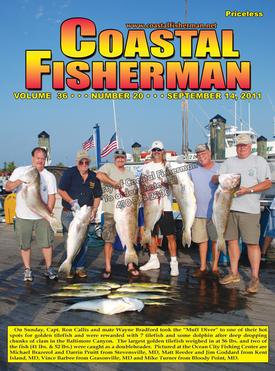


Article by Larry Jock
 NOAA Fisheries Releases 2010 Fisheries of the U.S. Report
NOAA Fisheries Releases 2010 Fisheries of the U.S. Report
NOAA Fisheries released its Fisheries of the United States 2010 report, an annual snapshot of the landings and value of U.S. fisheries. This year it contains some good news - landings were up and the value of those landings was up. U.S. commercial fishermen landed 8.2 billion pounds of seafood valued at $4.5 billion in 2010, an increase of 200 million pounds over 2009 and an increase in value of more than $600 million from 2009.
The report also highlights the top U.S. ports including the leader for the 22nd consecutive year, the Alaska port of Dutch Harbor-Unalaska. And, for the 11th consecutive year, New Bedford, Mass., had the highest valued catch, due in large part to the sea scallop fishery.
Another aspect of the report is seafood consumption. In 2010, the average American ate 15.8 pounds of fish and shellfish, a slight decline from the 2009 figure of 16 pounds. On a global scale, the U.S. continues to be third-ranked for consuming fish and shellfish, behind China and Japan. Imported seafood continues to increase to help fill consumer demand - about 86 percent of the seafood consumed in the U.S. was imported from overseas.
As Eric Schwaab, NOAA Assistant Administrator for Fisheries, said in the announcement, “These increases in fish landings and value are good news for our nation's fishermen and for fishing communities, where jobs depend on healthy fish stocks. We know fishermen are making sacrifices now to rebuild fish populations, and these efforts, combined with good science and management, support sustainable jobs for Americans.”
U.S., European Union to Strengthen Cooperation to Combat Illegal Fishing
NOAA Administrator Dr. Jane Lubchenco and Maria Damanaki, European Union commissioner for maritime affairs and fisheries, signed a historic statement pledging bilateral cooperation to combat illegal, unreported and unregulated fishing, known as IUU fishing — a first for the longstanding partnership between the U.S. and the E.U. on fisheries management.
The European Union and United States rank first and third, respectively, as the world’s top seafood importers (Japan is second). Globally, illegal fishing deprives legal fishermen and coastal communities of up to $23 billion of seafood and seafood products annually. This puts honest fishermen at a disadvantage in the global marketplace. The U.S. and the E.U. recognize their responsibility to protect the oceans’ vital food and biodiversity resources.
In the statement, the U.S. and the E.U. make it clear that they are committed to cooperating on combating IUU fishing as the only effective way of ending these practices. Among other things, they agree to work together to support the adoption of effective management measures in regional and international organizations to combat IUU fishing; promote tools that prevent IUU operators from benefiting economically from their illegal activities; exchange information on IUU activities; and promote the sustainable use of fisheries resources while preserving marine biodiversity.
“Illegal, unreported and unregulated fishing is one of the most serious threats to American fishing jobs and fishing communities, as well as to the health of the world’s oceans,” said Dr. Lubchenco, who is also under secretary of commerce for oceans and atmosphere. “International cooperation across oceans will help us maintain a level playing field for our fishermen by strengthening enforcement and preventing illegal fishing.”
"IUU fishing is a criminal activity, and we have the duty to do everything possible to stop this practice,” said Damanaki. “Today's agreement will help us to do just that. By joining forces, we make it harder for culprits to get away with their dirty business."
Individually, the United States and the E.U. have already put in place a number of legal measures to combat IUU fishing, such as the U.S. High Seas Driftnet Fishing Moratorium Protection Act that identifies countries engaged in IUU fishing and an E.U. regulation that blocks illegal seafood imports without the required certifications. Both participate actively in international fishery management organizations and promote international instruments to address IUU fishing.
“We will use all the tools at our disposal to clamp down on IUU fishing and prevent illegal seafood from entering our market. With all the sacrifices U.S. fisherman have made, they deserve no less.” Dr. Lubchenco said. “The U.S. and the E.U. share common challenges in fisheries management, so working together will bring us closer to achieving a shared vision of sustainable fisheries.”
The U.S. is turning a corner in ending overfishing and rebuilding stocks. Landings have increased by more than 200 million pounds and all coastal regions of the country saw increases in total value of these landings in 2010, over last year. Meanwhile, the E.U. is in the process of reforming its Common Fisheries policy designed to rebuild its own fisheries and is looking to learn from the United States’ success stories. Beyond domestic boundaries, there is an increasing need for international cooperation, especially among major fishing and seafood-importing nations, to improve global fisheries management of shared marine resources and to preserve the associated employment and other economic benefits of sustainable fisheries.